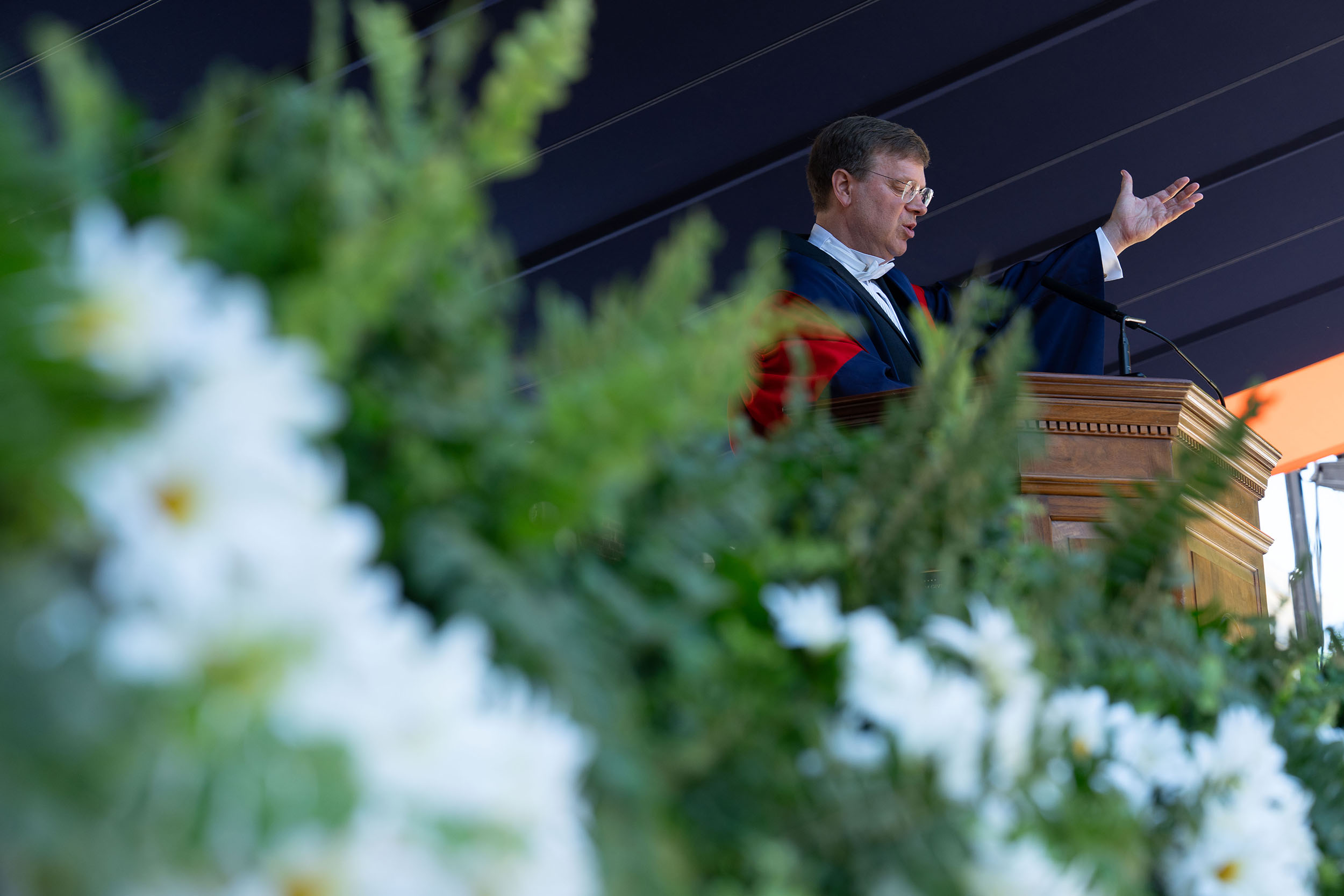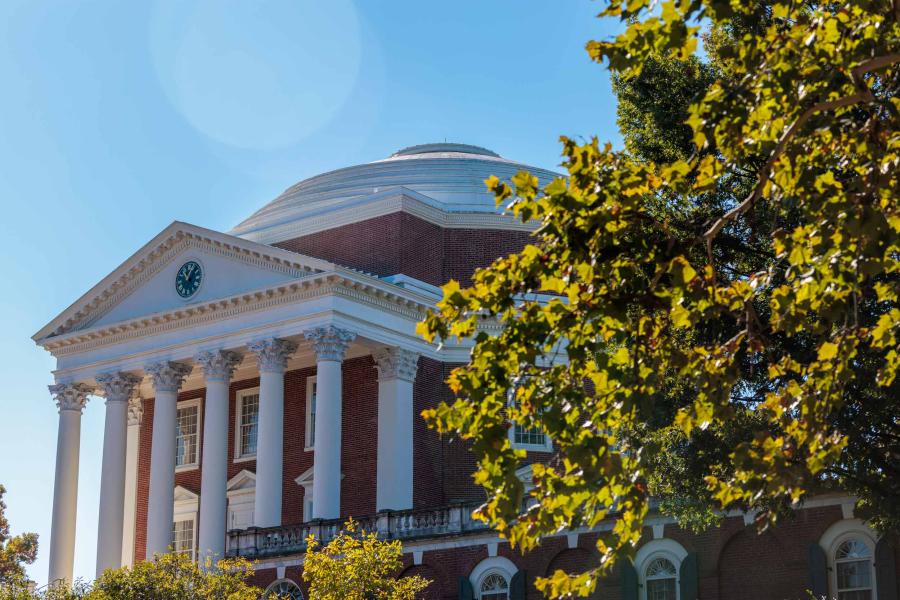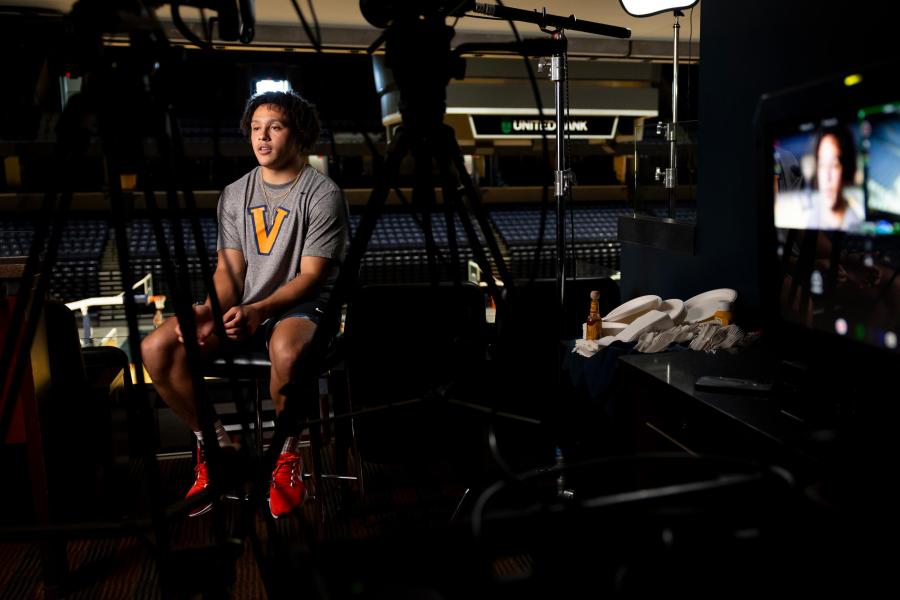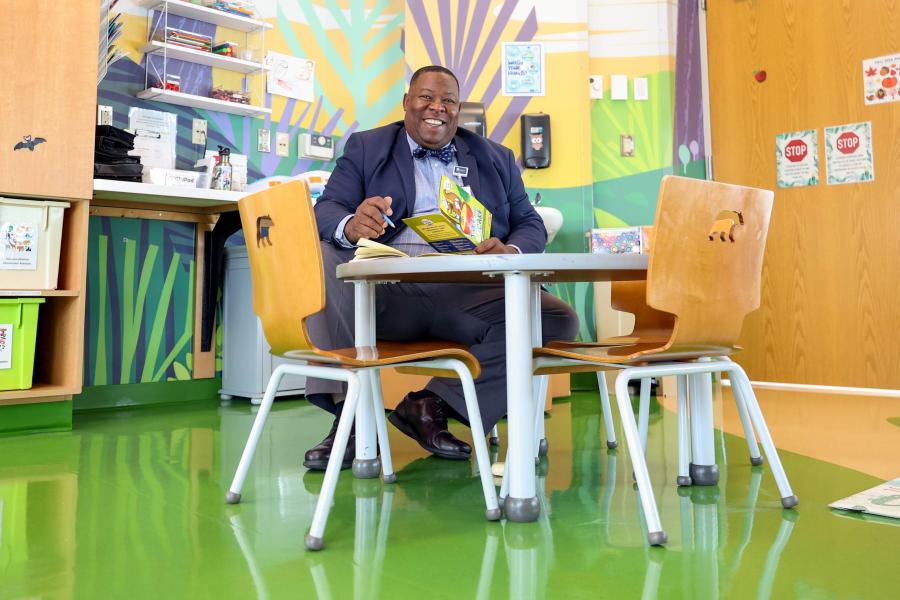Remarks prepared by Michael Suarez, University Professor and director of the Rare Book School, to deliver to the University of Virginia Class of 2025 on May 17 on the Lawn.
At Finals, Rare Book School Director Celebrates Education’s Role in Democracy
Thank you, Mr. Rector. Esteemed members of the Board of Visitors and platform party, Mr. President, fellow faculty, parents and friends of the graduates, members of the Class of 2025.
Bart Giamatti, known to many of you perhaps as the former Commissioner of Major League Baseball, had a job of far less consequence before that, as president of Yale University, a school in Connecticut.
Now, Mr. Giamatti was Yale president when a precocious 17-yr-old named Jim Ryan matriculated there—and in many respects he became something of a model for young Jimmy. And yet our great leader must not have been paying attention when Giamatti publicly declared on several occasions this immutable truth. “Being a college president,” he asserted, “is no way for an adult to make a living.”
We gather this morning with joy to celebrate the accomplishments, the perseverance, and the character of the Class of 2025—those who are taking UVA degrees today as citizen scholars of The Frank Batten School of Leadership and Public Policy; the School of Education and Human Development; and the College of Arts and Sciences. Will Rogers once observed, “A simple man may rob from a freight train, but give him a college degree and he will steal the whole railroad.”
You are proceeding to bachelors’ degrees and being awarded masters and doctorates. Each of you has your own story: the high school teacher who made a subject come alive for the first time; the mentor who believed in you; the mom or dad who sacrificed more than you might even know. And let’s not forget the friends who helped to get you through. For each of you, this beautiful morning is the triumph of a hope begun long ago. Please, never fail to remember how you came to this day. No One Walks The Lawn Alone.
This morning your professors, families, and friends have become a congregation of the grateful, full of thanksgiving and laughter, as we celebrate you. Your magnificent and ridiculous balloons, a riot of color and quirkiness, a carnival of individuality and community, are eloquent and motley emblems of this excellent day.
I think it was Voltaire who said that no student was ever sufficiently grateful to his teachers. If you happened to be in my class, now is the time for you to know that I wear a 16/34 shirt and I drink single malt whiskey.
Our Final Exercises today recognize the academic excellence that you have achieved, even as we also celebrate the University that has been the instrument of your progress, the institution that you have helped to make a vibrant and dynamic community of learning.
The University of Virginia opened 200 years ago in the spring of 1825 with 40 students, eight faculty, and nearly 7,000 books. Forty years later, UVA was the second largest university in America. From early on, there were problems of student unruliness, in part because one individual was “in the habit of selling spiritous liquor in the cellar of one of the pavilions.”
In many ways, what we are doing today in conferring degrees is quintessentially un-Jeffersonian. TJ dismissed academic degrees as “artificial embellishments” – I’m sure you’re glad to know – and the University did not award the bachelor’s degree until 1848. Go figure.
Celebrating you and our university on this bicentennial, it is fitting that we also remember the work of higher education in America, for UVA was founded on the aspiration that its mission of scholarship and teaching could powerfully support and sustain our American experiment. In this hope for the role of the University as a lynchpin of democracy, Jefferson was not alone.
James Madison proposed that a national university be included in the U.S. Constitution. George Washington, during his first State of the Union Address, urged Congress to create a university to teach its students “to distinguish between oppression and the necessary exercise of lawful authority.” So committed to this idea was the Father of Our Country that in his last will and testament he left a generous bequest for this very purpose.
Madison, who became rector of the University of Virginia after Jefferson’s death, never ceased to believe in the central importance of the American university as a bulwark of democratic freedom: “The Advancement and diffusion of knowledge,” he insisted, “is the only guardian of true liberty.” Therefore, said Madison, “Learned Institutions [Universities!] ought to be favorite objects with every free people.”
Washington and Madison well understood that education fosters a freedom of mind that leads to the judicious exercise of critical citizenship, a freedom of mind that recognizes the obligation to protect and defend the freedoms of others.
None of the Founders could possibly have foreseen, however, how far the American university has come. “Predictions are very difficult to make,” Mark Twain reminds us, “especially when they deal with the future.” In recent global rankings, U.S. universities occupied eight of the top 10 spots in the world, and 15 of the top 25. Simply put, the American research university has been, is now, and must continue to be an unmatched incubator for excellence in research and teaching.

UVA President Jim Ryan and Suarez make their way to the stage beneath brilliant blue skies for Saturday’s Final Exercises. (Photo by Matt Riley, University Communications)
American universities produce an astonishingly high proportion of the world’s fundamental research discoveries and practical breakthroughs: the GPS on your phone; the MRI used to diagnose a family member’s injury; laser technologies in the operating room and the grocery store; the Head Start program; synthetic insulin; the core algorithm that drives your Google search; and even the LED headlights, the FM radio, and the synthetic rubber tires of the amazing car that each graduate will no doubt receive this happy day. All these improvements to the quality of our lives derive from the work of the American university.
Consider too that the University of Virginia—and the American university more broadly—is also a home for poetry, a haven for the study of history, a place for the creation of beauty, and for the curation of a dazzling array of languages, cultures, and ways of thinking about the world.
The work of the university is meant to help us escape the confines of our limited experience, offering instead a broader community and an invitation to learn about the history of human aspiration and achievement across times and places unlike our own.
Freedom, then, is the great purpose of a liberal education. As students and teachers, our work together is meant to help liberate us and our society from ignorance—and from the fear, irrationality, and prejudice that are the close companions of ignorance and narrowmindedness.
But consider this: the freedom we seek through the work of scholarship and teaching is never only freedom from whatever prevents us from rising to the full stature of our humanity. No, the goodness of this place is also most fully realized in freedom for: the ability to make informed commitments to be of help: freedom for teaching, freedom for leadership, freedom for the work of making our world a little more compassionate, a little more intelligible, a little more just.
You know this already. The freedom from that comes from getting up most mornings and going for a run—or in my case what sadly passes for a run—is freedom from lethargy and disease, but a lived commitment to working out may also give you the freedom you need for hiking on vacation, or entering a 10k with your friends.
Academic freedom—the ability to pursue the truth wherever it might lead, and to make publicly available what one believes is true without interference or reprisal—is thus not the arcane privilege of an unworldly intellectual guild, but a prerogative essential to the functioning of our Republic and the education of its citizenry. As a producer of knowledge, teacher of skills and judgment, and caretaker of cultures and learning, the American university is entrusted with the work that helps guide and guard the full exercise of democratic freedom.
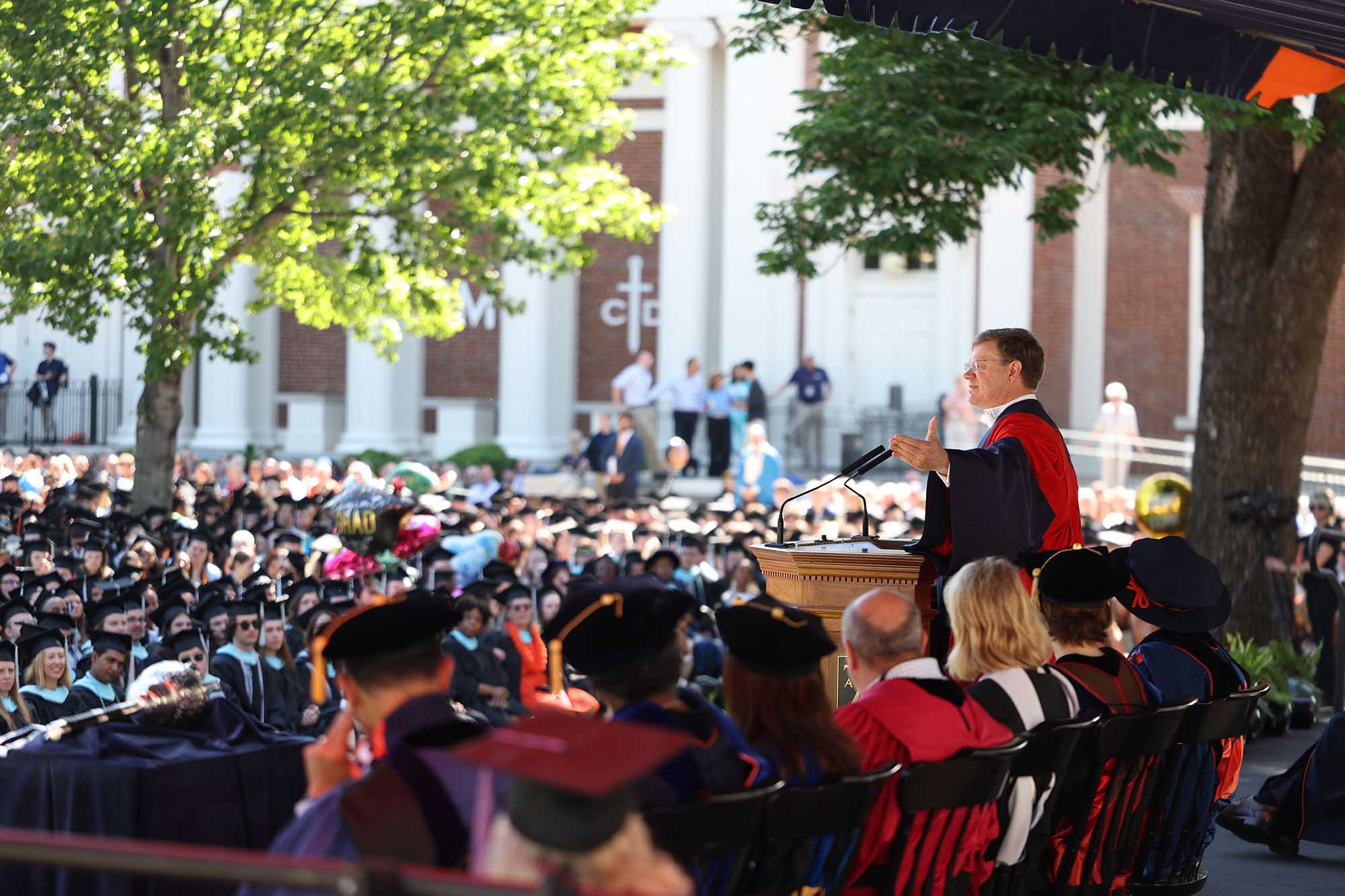
Telling graduates “this beautiful morning is the triumph of a hope begun long ago,” Suarez encourages the grads to “never fail to remember how you came to this day.” (Photo by Matt Riley, University Communications)
Make no mistake: the freedom of the American university is not to create or preserve an insular autonomy. The intellectual reach of the university exists to serve the whole of humanity, for the pursuit of truth is an essential good common to all.
It is our duty to promote dialogue across difference, to provide opportunities for citizens of the university to be in conversation—and even debate—with individuals unlike themselves, people whose thinking will challenge our views and perhaps enlarge our understandings.
The imperative of free speech on our Grounds—and in every corner of the American college campus—follows not only from our legal obligations, but also from our unswerving belief in the value of creating a pluralistic community of mutual inquiry and mutual respect. The moral contour of the American university must make it a place that honors all individuals’ search for transcendent meaning, and each group’s practice of faith.
On our 200th anniversary, you may be certain of this: Our ability to pursue the truth and communicate it freely is a national asset. The American university must compromise neither its moral position nor its vision, lest the Republic and its citizens lose one of its most essential ways of learning about and understanding the world. “Knowledge is power,” said the first rector of this university, “and,” he added, “… ignorance is weakness.”
I myself have had an indelible experience of this truth. The most life-changing class I took in college was an unintelligible combination of chemistry and quantum mechanics. As the semester progressed, I increasingly found myself standing in my intellectual underwear and feeling the breeze. I barely escaped with a C—and so here I stand before you: a professor of English Literature.
Then, in my second year of graduate school, the teacher I respected most, a veteran educator of more than 40 years, lowered the boom: “You are wasting your time!” she declared. “You think the bar is here [pointing with her hand], but you have no idea—excellence is way up here and you should be chasing it, but instead you are wasting this opportunity.” As you might imagine, I was devastated. But what Dorothy Whitehead Bednarowska did for me is what universities must sometimes do for the societies we serve: to challenge and call them to a greater faithfulness, a deeper rigor, a more durable good.
The critical intelligence and civic acumen required for the exercise of responsible citizenship must be cultivated. For 200 years, the best place for that cultivation has been the American university, an arena for the competition of ideas through reasoned debate, a community where students and faculty together learn to treat complex problems with careful judgment, thoughtful attention, and unhurried deliberation.
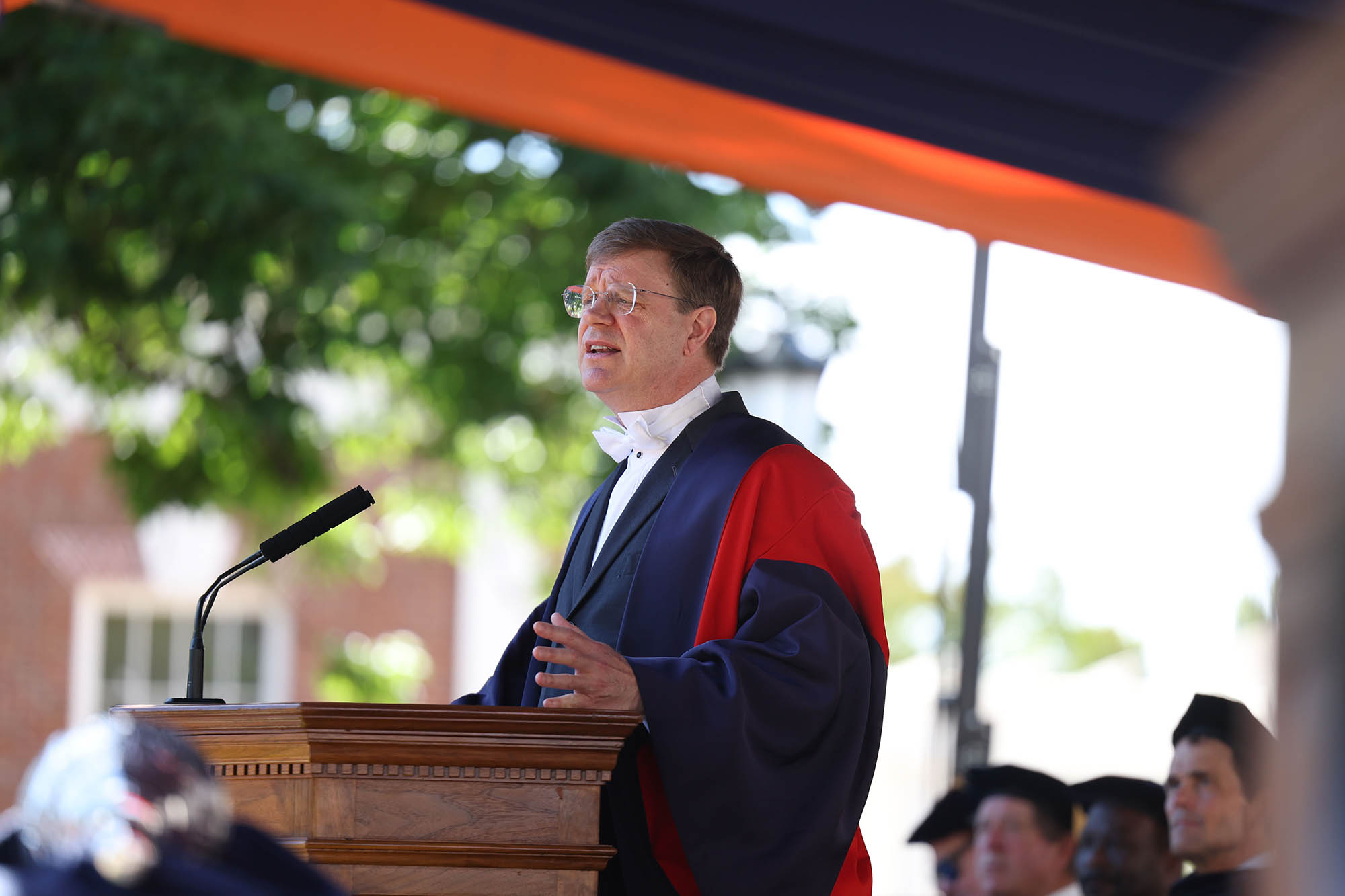
Suarez reminds graduates a university education means learning how to question ideas, test ideals and decide what’s worth believing. (Photo by Matt Riley, University Communications)
I am, I confess, a great believer in slow food. If the rector invites me to his home for dinner and serves a bucket of Popeyes Chicken, I’ll be grateful for his company and conversation. But if he makes a special dinner that his mom used to cook when he came home from UVA, then I’ll also be grateful for the time he took, because good food takes genuine effort.
The university is a place of slow knowing. As you will have come to appreciate, real knowledge requires time.
We use our education not only through what we have learned, but by how we continue to test the ideas and ideals of our day. Constructive skepticism rooted in tests of evidence and rationality, enables us to evaluate the cogency of arguments as we decide what we should doubt—and what to believe.
Many of you will remember that episode from Ted Lasso featuring the darts competition when Ted explains to Rupert that his motto is, “Be curious, not judgmental.” The scene highlights the importance of asking questions, as Ted defeats the cocky and entitled Rupert whose confidence is built on false assumptions.
Convinced that no one discipline or perspective can fully illuminate our circumstances, we undertake the work of asking difficult questions as a multidisciplinary community, humbly understanding that our labors can yield only one small part of what we need to know. Our hope is that together we may become a light for our time.
Two hundred years ago, the University of Virginia made a promise to itself and a pact with the nation to be a place where students’ lives are changed, where the citizens of these Grounds leave better equipped for outstanding service of the common good.
My hope is that the combination of your hard work and our educational partnership has given you the ability to land a job, or go to grad school, certainly. But my deeper ambition for you is that our conversations over these years will have broadened your understandings and enlarged your hearts.
In much the same way, I remain ambitious for our American experiment—and I look to the American university to keep faith with the nation by staying faithful to its mission of free inquiry and unfettered excellence.
Thank you.
